Questions in this section focus on flexible funding and purchasing guidelines, including the ways it is used and how to simplify the rules.
On this page
Setting eligibility for flexible funding
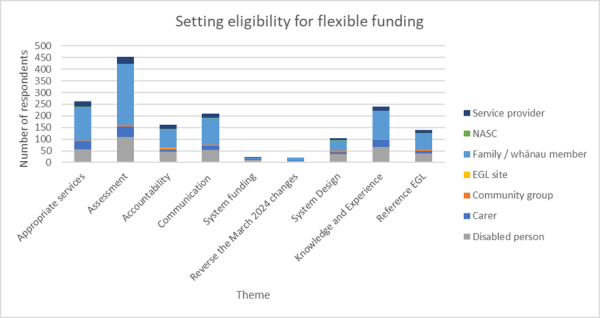
What things need to be worked through in setting eligibility for flexible funding
|
Assessment criteria |
Assessment experience |
Knowledge of assessment |
Access to services |
Access to information |
Clear processes and guidelines |
Holistic approach |
Knowledge & experience |
Workforce capability |
Workforce capacity |
Funding |
System design and policy |
Communication |
Integration |
Assessment timeline |
Assessment frequency |
Need to consider outcomes |
|
|---|---|---|---|---|---|---|---|---|---|---|---|---|---|---|---|---|---|
|
Carer |
5 |
23 |
9 |
4 |
11 |
20 |
2 |
3 |
2 |
22 |
7 |
20 |
3 |
11 |
2 |
9 |
|
|
Community group |
2 |
2 |
1 |
2 |
5 |
1 |
1 |
4 |
3 |
2 |
1 |
2 |
2 |
||||
|
Disabled person |
13 |
26 |
20 |
16 |
46 |
45 |
8 |
13 |
18 |
7 |
18 |
35 |
46 |
5 |
17 |
15 |
11 |
|
EGL site |
1 |
1 |
1 |
||||||||||||||
|
Family / whānau member |
9 |
76 |
20 |
10 |
58 |
67 |
18 |
10 |
34 |
9 |
45 |
45 |
94 |
8 |
24 |
28 |
26 |
|
NASC 1 1 |
|||||||||||||||||
|
Service provider |
3 |
7 |
3 |
10 |
17 |
3 |
5 |
7 |
2 |
8 |
14 |
19 |
8 |
1 |
9 |
4 |
1,036 people responded to the question ‘What things need to be worked through in setting eligibility for flexible funding?’
21% of family/whanāu members who responded to this question felt communication was important.
20% of respondents felt that clearer communication would improve consistency and transparency across all processes and parts of the system.
10% of respondents felt that processes and systems should be simplified, more nationally consistent, and more transparent.
Some felt that the parts of the system (for example, NASCs and hosts) should work together more cohesively, with less bureaucracy. 2% of respondents also felt that further investment was needed to improve DSS.
For families and disabled individuals, this system feels disconnected from the reality they face, and the reliance on government decisions means there’s little room for flexibility or adaptation based on personal circumstances. - Family/Whānau Canterbury (including Chatham Islands)
23% of respondents emphasised the knowledge and experience they held from having a disability (or a family member with a disability), and the inherent knowledge that comes from living through it daily.
Respondents felt there should be greater representation of disabled people as decision makers for DSS, reflecting the mantra “nothing about us, without us”.
A further 13% of respondents highlighted that the principles of EGL and UNCRPD should be pursued and implemented across DSS.
Consultation for starters, not just govt saying what’s going to happen ! - Carer, Wellington
We as disabled people have a better understanding of our needs and requirements than the government. - Disabled person, Wellington
One of the principles of EGL is about giving the disabled person choice and control in their lives. That needs to be a paramount consideration when considering flexible funding. - Carer, Nelson/Marlborough/West Coast
3 key areas were identified to improve access to flexible funding: the purchasing guidelines, assessments and eligibility, and accountability to manage funds. These are explored individually below.
25% of respondents wanted to see changes to the purchasing guidelines, highlighting that flexible funding was often no longer able to be used in a suitable or practical way.
2% of respondents explicitly recommended reversing the March 2024 changes, while many more said these changes had negative outcomes.
I feel the system worked pretty well prior to the changes. We were supported and guided. The carers need to be consulted and actually listened to as we are the ones doing the caring and know what is needed to help support our disabled person.- Family/Whānau Canterbury (including Chatham Islands)
There should be clear information about what flexible funding is and what alternatives are available. - Family/Whānau, Waikato
44% of respondents discussed assessment and allocation mechanisms as critical tools to set flexible funding policies.
Many of the respondents felt a needs-based approach was necessary to understand the diversity of disability and what was required to support disabled people and their families. This included factors such as: the diversity of impairments, income, rurality, permanence of impairment, culture, family contribution and the impact upon the family.
Respondents highlighted the unfairness of current eligibility settings, calling for all disabled people to be eligible for DSS and flexible funding. Others requested impairments such as FASD, ADHD, mental health (such as depression and anxiety) be made eligible for DSS.
Develop a comprehensive framework for assessing individual needs, ensuring it takes into account diverse circumstances and promotes equity. Allowing funds to be used for a variety of purposes, depending on individual circumstances, while ensuring that there are guidelines to prevent misuse. - Carer, Taranaki
16% of respondents focused on accountability mechanisms to improve flexible funding access. These suggestions varied substantially, with several suggestions covering who should be included in the scheme, how disabled people should be set up to succeed in using the scheme, the mechanisms to manage the scheme and protect disabled people and their families, and the values that should underpin all elements of the scheme.
Eligibility for flexible funding should only be removed when past evidence has demonstrated the person does not have the skills or appropriate support to effectively manage flexible funding. - Service Provider, Wellington
Flexible funding was a critical method to access supports
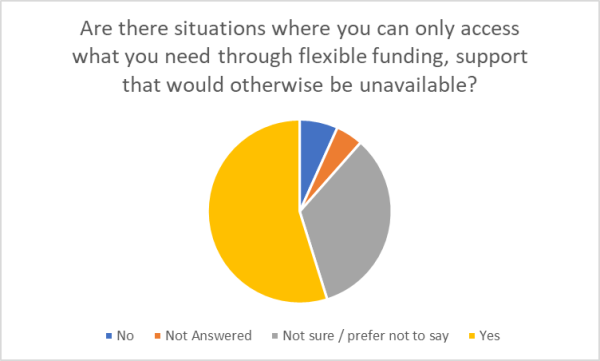
Are there any situations where you can only access what you need through flexible funding, support that would otherwise be unavailable?
|
Answer |
Percentage |
|---|---|
|
Yes |
55% |
|
No |
7% |
|
Not sure |
34% |
|
Not answered |
5% |
There were 924 responses to the question ‘Are there any situations where you can only access what you need through flexible funding, support that would otherwise be unavailable?’
Responses varied by region. Over 50% of respondents from every region except for 1 responded with ‘Yes’.
29% of respondents from the East Coast responded with Yes. There were 769 responses to the follow up question asking for examples where access to support is only available through flexible funding.
Most respondents (50%) explicitly mentioned the critical value of flexibility that had been provided through the scheme.
This flexibility enabled disabled people and their families to purchase supports that directly benefitted them, reflecting the diversity of disability and accommodating changes to circumstances over time.
2% of respondents indicated they were confused about what funding was allowed to be used for or what was available elsewhere.
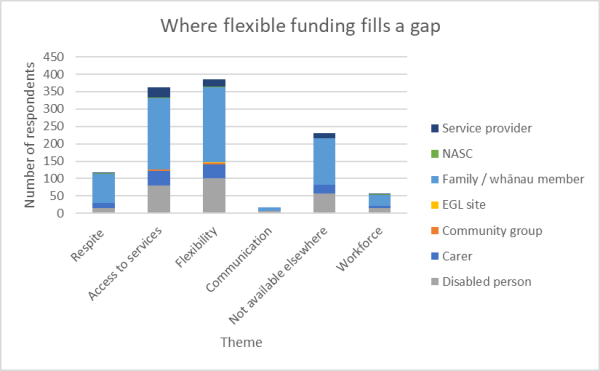
What are some examples? - Example for only support only able to access through flexible funding
|
Respite |
Access to services |
Flexibility |
Communication |
Not available elsewhere |
Workforce |
|
|---|---|---|---|---|---|---|
|
Carer |
16 |
42 |
40 |
1 |
25 |
5 |
|
Community group |
5 |
4 |
||||
|
Disabled person |
15 |
80 |
101 |
6 |
57 |
16 |
|
EGL site |
1 |
|||||
|
Family / whānau member |
83 |
203 |
217 |
10 |
133 |
33 |
|
NASC |
1 |
3 |
2 |
1 |
||
|
Service provider |
2 |
30 |
21 |
15 |
3 |
It means we can make decisions based on the needs at the time. It means i can partly pay myself as a carer as it is impossible to work fulltime with a very high needs family member ( many sick days, and hospital visits often at short notice) I have control over choosing the supports and resources he needs as his needs and our circumstances change. The flexible funding has changed our life, in the past with the layers present to access resources my family has experienced a great deal of stress and the resource has been wasted and sucked up by institutions that did not meet our needs. Our life is very challenging, but having some power over how we access support has been a game changer. - Family/Whānau, Canterbury (including Chatham Islands)
My partner's needs are increasingly complex due to a deteriorating condition - if we were not funded through an EGL agency he would get less support - I would definitely have to leave my job. - Family/Whānau, Canterbury (including Chatham Islands)
15% of respondents provided feedback on their use of flexible funding to access respite.
Respondents shared frustration with current purchasing guidelines that they saw as preventing access to practical methods of respite.
Single parents and those without extended family and community support, in particular, pointed to the increased rate of carer burnout and social isolation. Respondents felt the current purchasing guidelines undermined and undervalued the critical work carers provided and the support respite gave them.
I can no longer pay for travel and accommodation for respite from my 11 year old autistic daughter. She can't access respite outside of the home herself, so my only.option is to leave the house myself. I can no longer use the funding for this. - Disabled person, Wellington
When you have a child with complex needs it is so difficult to find a way to have some 'respite', you have to think creatively and work out a way - in an individualised way - what works for one will not work for another. It is generally more expensive and you have to think creatively. That is the way it is. - Family/Whānau, Wellington
8% of respondents highlighted the importance of hiring their own staff, whether these be family members or not.
Choice over staff provided a greater level of trust between the disabled person and their staff, and greater control in setting their schedules.
Some respondents had chosen their support workers because of their specific expertise, or their willingness to coach and upskill the disabled person and their families. Others were able to source support workers in regions where providers were not present.
Unique cultural and language requirements simply cannot be catered for under an inflexible model when residing in a remote location so family and close friends have to step in. - Family/Whānau, Northland
47% of respondents provided feedback on the government funded services they had accessed privately through flexible funding.
This included other DSS supports such as equipment modification services (EMS) or behavioural support, as well as supports that are the responsibility of the Ministry of Education (MoE), MoH, Ministry of Transport (MoT), and MSD.
Flexible funding was used as these supports were not disability inclusive or accessible, were insufficient to meet the needs of disabled people and their families, were not consistently available, or had substantial waitlists.
Yes, flexible funding is often the only way to access the specific support my nephew requires. Without it, I wouldn’t have the option to customise his care to meet his complex needs. For example, flexible funding allows me to hire specialised carers, arrange therapy sessions, and manage his unique behavioural and emotional support—all tailored to what works best for him. Traditional funding doesn’t typically cover these personalised options, leaving families like mine without the vital resources we rely on. Flexible funding gives us the freedom to make decisions based on real needs rather than predefined, limited services, ensuring my nephew receives the right support for his well-being. - Carer, Canterbury (including Chatham Islands)
We used to be able to use funding for private therapy, equipment, housing modifications etc that weren't publicly funded (e.g if didn't meet criteria) or if waitlists were many years long or publicly not avaliable in our region. - Family/Whānau,Taranaki
30% of respondents highlighted the range of supports they did not believe were funded by any government agency.
Support focused in 3 areas:
- consumables for self-regulation, such as sensory items, crafts, and items for special interests
- participation in the community, such as transport to events, and support for the Special Olympics
- supports to build independence or maintain independence for degenerative conditions, including mobility therapies and innovation – including use of new technologies.
Currently I cannot participate fully in society because the only funding for interpreters is health or employment related. How would YOU like to be only able to understand things in the workplace or a health setting but not at a whanau gathering like a wedding, tangihanga, or socially like a movie, party, theatre, community support group, or inspirationally like a night class, hobby group, volunteer work to name but a few. - Disabled person, Wellington
Families who use IF rather than residential providers to provide homes for their sons have so many more opportunities to be innovative, and responsive to their son or daughter’s needs and aspirations. As one example, it allows homes where those with and without disability can live together. - Family/ Whānau, Wellington
Clarity about what flexible funding can be used for
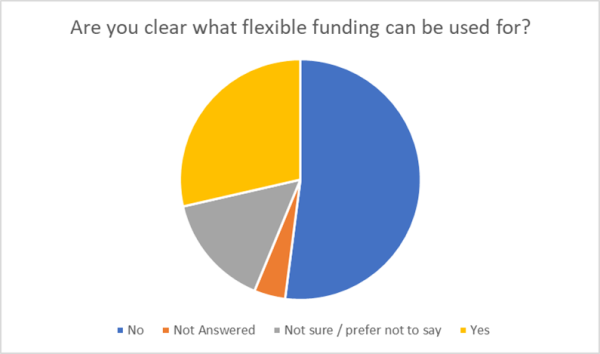
Are you clear what flexible funding can be used for?
|
Answer |
Percentage |
|---|---|
|
Yes |
29% |
|
No |
52% |
|
Not sure/prefer not to say |
15% |
|
Not answered |
4% |
1,210 people responded to the question ‘Are you clear what flexible funding can be used for?’
44% of service providers were not clear what flexible funding could be used for.
Over half of carers, family/whānau, and disabled people also were also not clear. Respondents answered the follow up question ‘What suggestions do you have to make flexible funding simpler?’
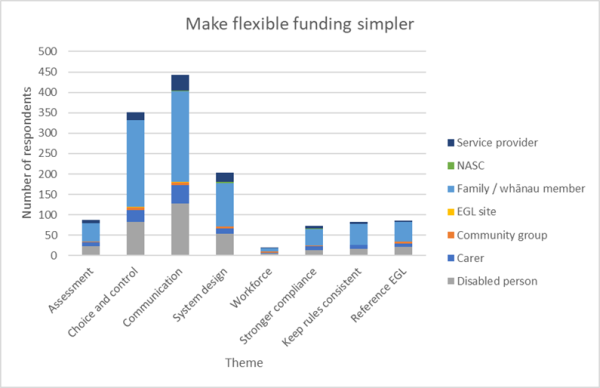
What suggestions do you have to make flexible funding simpler?
|
Assessment |
Choice and control |
Communication |
System design |
Workforce |
Stronger compliance |
Keep rules consistent |
Reference EGL |
|
|---|---|---|---|---|---|---|---|---|
|
Carer |
9 |
30 |
44 |
12 |
3 |
11 |
9 |
9 |
|
Community group |
1 |
6 |
7 |
5 |
2 |
1 |
5 |
|
|
Disabled person |
24 |
82 |
128 |
54 |
5 |
13 |
17 |
21 |
|
EGL site |
1 |
1 |
||||||
|
Family / whānau member |
45 |
213 |
222 |
106 |
8 |
40 |
52 |
48 |
|
NASC |
3 |
3 |
1 |
|||||
|
Service provider |
8 |
19 |
37 |
24 |
2 |
7 |
5 |
3 |
21% of respondents felt the DSS systems were overly complex and bureaucratic with poor transparency in processes and expectations, and poor consistency in the application of processes across the country.
This created additional stress and fatigue for disabled people and their carers and disempowered them in managing their funds with confidence and independence.
9% of respondents felt the system would be better if it reflected the EGL principles.
establish clear guidelines to support disabled people, clinicians and assessors. - Service provider, Central
A streamlined application process with clear guidelines, reducing bureaucracy and making it easier for individuals to understand what info is needed. Providing a user-friendly online portal where individuals can apply for funding, track their applications, and manage their budgets would also enhance the experience. I believe that offering support through dedicated case managers or navigators can help individuals understand their options & assist with the application process. I suggest creating standardised, simple forms that avoid complex jargon, making it easier for applicants to provide the necessary information. Training for staff involved in managing flexible funding programs can improve communication and ensure they are equipped to assist applicants effectively. - Disabled person, Northland
44% of respondents highlighted the impact of inadequate and inaccessible communication. Communication was often inaccessible for different disabilities and language requirements.
The quality of communication had substantially decreased since March 2024 changes. Many respondents did not know what the rules were or where to go to find out.
2% of respondents identified the workforce as a critical method of sharing information, yet sometimes staff did not know the rules or did not have time to share information.
gain a central info hub where you can talk to someone would be extremely helpful. Fully accessible of course with staff committed to disability right approach. - Disabled person, Bay of Plenty
35% of respondents wanted to see greater choice and control in the purchasing rules than was currently allowed. Increased flexibility in purchases would reflect the diversity of disability needs and provide a method to access support that would otherwise be inaccessible.
9% of respondents felt assessments should be needs based, to identify the areas where flexible funding would be beneficial. People thought assessments should consider the needs of the family as well as the disabled person.
Greater autonomy and trust were requested by some respondents. Suggestions included allowing the same degree of autonomy as the benefit or having no rules for under $10,000 allowances.
8% explicitly wanted to reverse the March 2024 changes.
Needs specific. Not just a blanket rule. - Family/Whānau, Canterbury (including Chatham Islands)
Trust the family to know where they need help. Trust the individual to know their needs. - Disabled person, Auckland
Make it goal driven to support disabled people to succeed in their life goals that are on a par with their peers. - Community Group, Wellington
7% of respondents provided feedback on various compliance methods. This included auditing, peer support, providing support to ensure funds last the full year, or enabling disabled people and their families to spend their allocation with the knowledge that there will be no top ups if it is finished before the review.
Give a yearly allocation with some peer support – disabled person, Canterbury (including Chatham Islands)
Making purchasing rules easier to understand
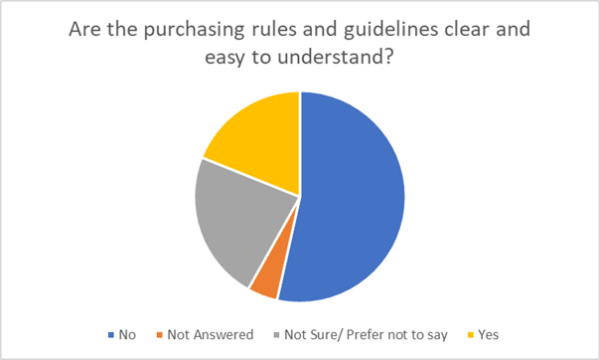
Are the purchasing rules and guidelines clear?
|
Answer |
Percentage |
|---|---|
|
Yes |
19% |
|
No |
54% |
|
Not sure/prefer not to say |
23% |
|
No answer |
4% |
1,087 people responded to the question ‘Are the purchasing rules and guidelines clear and easy to understand?’
1,431people responded to the question ‘What suggestions do you have to make the purchasing rules or guidelines easier to understand?’.
64% of carers and 56% of family members felt the rules were not easy to understand.
665 people responded to the follow up question ‘What suggestions do you have to make the purchasing rules or guidelines easier to understand?’
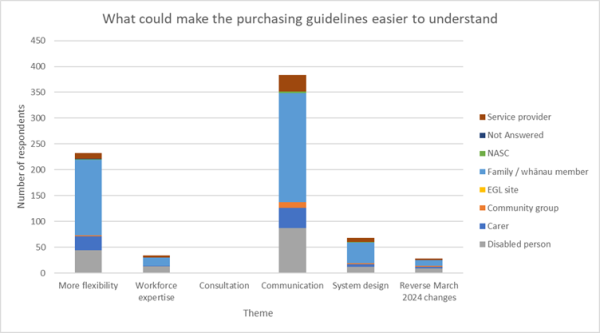
What suggestions do you have to make the purchasing rules or guidelines easier to understand?
|
More flexibility |
Workforce expertise |
Consultation |
Communication |
System design |
Reverse March 2024 changes |
|
|---|---|---|---|---|---|---|
|
Carer |
27 |
1 |
39 |
5 |
3 |
|
|
Community group |
2 |
11 |
2 |
2 |
||
|
Disabled person |
44 |
13 |
87 |
12 |
9 |
|
|
EGL site |
||||||
|
Family / whānau member |
146 |
16 |
211 |
40 |
11 |
|
|
NASC |
1 |
3 |
1 |
|||
|
Not Answered |
1 |
|||||
|
Service provider |
11 |
4 |
1 |
33 |
8 |
3 |
35% of respondents highlighted the importance of flexibility in the rules.
The current purchasing guidelines were seen as hard to understand and this was worsened by frequent changes to these rules.
The rules were seen as too restrictive and do not enable the flexibility to fit disabled people and their family’s/whānau needs.
4% of respondents wanted the March 2024 changes reversed whilst 5% wanted further and improved consultation before any other changes took place.
Fewer restrictions would make it easier to think creatively find something that would work for our family. - Family/Whānau, Auckland
What is cost-effectives differs for each person. What is a disability support differs for each person. What is the point of filling out a purchasing support form and providing evidence that it fits the purchasing criteria if the goal posts are continually being shifted to ensure that it can be rejected as not being "cost-effective" or "a disability support". - Disabled person, Auckland
58% of respondents provided feedback on the need for better communication.
Communication needed to be consistent with accessible and alternate formats readily available from initial announcements.
Information needed to be available in many formats such as on websites, live web chats, pamphlets, and hotlines to ensure disabled people and their families/whānau can access information in the ways that work best for them.
Language needed to be plain, with clear examples and answers to common questions. Announcements needed to go through the appropriate channels and be available in multiple languages.
A key part of successful communication was also viewed as being through the workforce.
5% of respondents wanted staff to be knowledgeable and able to answer their questions. They wanted staff to also have the availability to spend time with disabled people and their families.
Some people and I am one of them don't always understand the way a sentence is worded for legality if it could be written in a much simpler form even if it was say twice as long so that again people with the disabilities can understand themselves rather than have someone just say or this is it abcdefg well I I want to understand it and I feel like it crazy idiot because I don't understand some of these huge big words with 20 syllables in. - Disabled Person, Waikato
Again you need to provide information in English, New Zealand Sign Language, and ensure there are face to face meetings that allow anyone to ask the questions they need to. Have regular workshops face to face and online. - Disabled Person, Auckland
10% of respondents highlighted issues across the disability support system, which increased complexity and reduced understanding.
People felt that processes are confusing and time consuming, which added to the barriers disabled people and their families/whānau faced in accessing the support they required.
The system was not applied consistently, either due to staff not following processes, or due to regional unavailability of support. EGL and principles-based approaches were identified as methods of redirecting and improving the system.
They are so complex, requiring considering multiple fund types to determine if I can use the funding. Family/Whānau, Auckland
Redesign the whole system and start from the beginning around defining how each service and rule fits together. - Family/Whānau, Wellington
If you put EGL into place this would almost eradicate the need for these guidelines. Family/Whānau, Southern